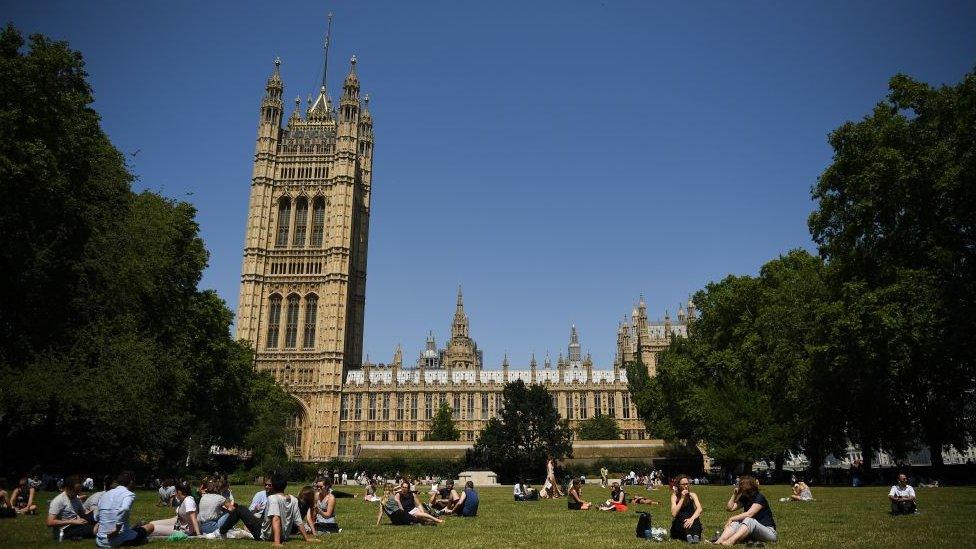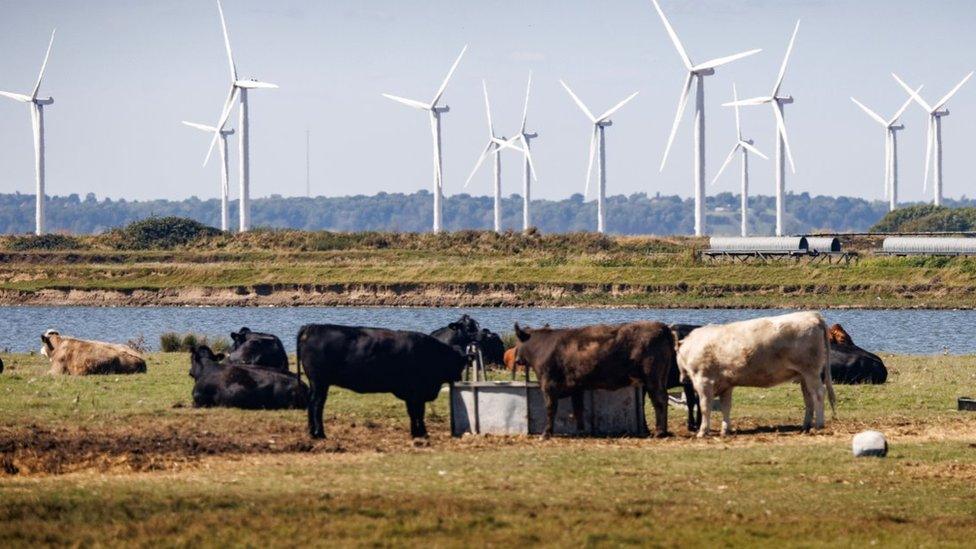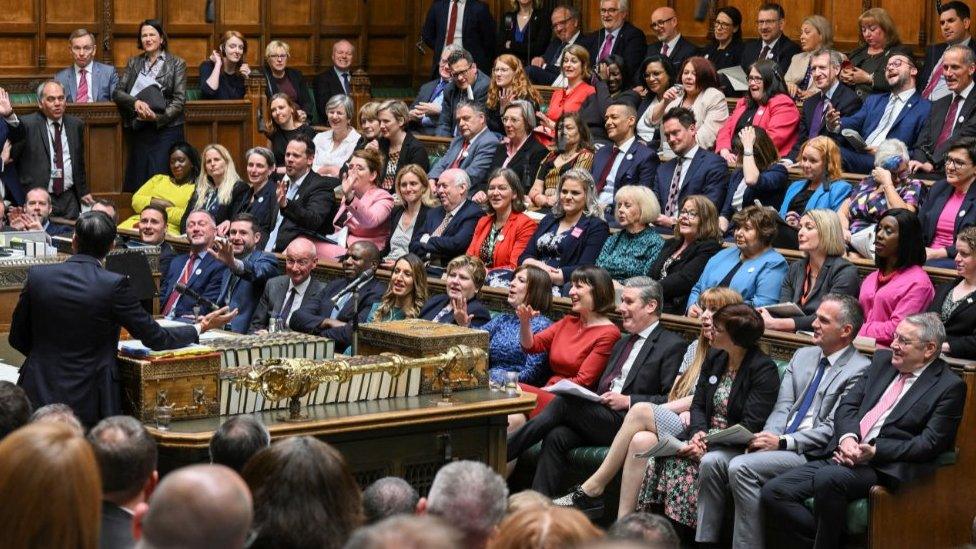What's happening in Parliament this week?
- Published

Parliament's back for a quick burst of law-making before breaking again for three weeks for the conference season.
MPs and peers will then have three more weeks to polish off outstanding legislation, before the current legislative cycle ends with the prorogation of Parliament, and a new one opens with the King's Speech on 7 November.
That means six weeks of tying up loose ends and negotiating over contentious details, especially for new legislation which is not being "carried over" into the next session. This is a moment when the opposition has a bit of leverage, with ministers trying to get their bills through against the clock, and the prospect of these being lost altogether if the other parties dig in their heels.
The big set-piece legislative action looks set to be the Commons consideration of the detail of the Energy Bill, providing an early test for incoming Energy Secretary Claire Coutinho.
She will have to navigate proposals for change from cross-party alliances of green-tinged MPs, and from backbenchers on the Conservative right, who're sceptical about the costs and pace of efforts to decarbonise UK energy. In the wake of the Uxbridge by-election result, this looks set to provide an interesting test of parliamentary - and ministerial - opinion on charging consumers for green policies.
In the Lords, peers continue their grind through the detail of the sprawling Levelling Up Bill, where the government has suffered nine defeats. Over the summer break, Levelling Up Secretary Michael Gove announced plans to use this bill to remove legacy EU laws on river pollution, which he claims are blocking the construction of 100,000 new homes.
But introducing these changes through late amendments in the Lords can be problematic; because they haven't been considered by MPs, ministers have no way to overrule peers if the changes are rejected.
Look out for the moving of writs for by-elections in Rutherglen and Hamilton West, where former SNP MP Margaret Ferrier was ousted by a recall petition, and in Mid Bedfordshire, where former Culture Secretary Nadine Dorries has finally resigned.
There will also be the ceremonial introduction of the three new MPs elected at by-elections in July. Each party has something to cheer about - the Lib Dems' Sarah Dyke (Somerton and Frome) revived her party's challenge in its old West Country heartlands; Labour's Keir Mather (Selby and Ainsty) provided his party with its biggest by-election triumph since the Major government; and Conservatives Steve Tuckwell defied expectations by holding Uxbridge and South Ruislip. Will one or more of them make an early maiden speech?
Monday 4 September
Commons: Work and Pensions Questions from 14:30, with any post-recess urgent questions or government statements following at 15:30. Perhaps a Ukraine update from new Defence Secretary, Grant Shapps?
Main debates: MPs consider Lords amendments to the Economic Crime and Corporate Transparency Bill - the government lost six votes in the Lords on issues like removing the exemption from the failure to prevent economic crime for smaller firms. And to add money laundering to the list of activities covered by the criminal offence of "failure to prevent".
Then they move on to the committee and remaining stages of the Northern Ireland Budget Bill - which sets the spending for Northern Ireland in the continued absence of devolved government there.
Westminster Hall: A debate on three petitions on assessments for disability benefits (16:30). E-petition 593296 says people with a lifelong illness should not be subject to regular reviews for eligibility.
E-petition 619481 says the government should remove the requirement for people claiming disability benefits to go through an assessment process. Claims should be based solely on evidence from medical professionals, such as a letter from a GP or consultant.
And E-petition 620962 calls for a full review of the PIP process, covering both DWP policy and the performance of private contractors ATOS and Capita, which conduct the health assessments.
Committees: Science minister George Freeman gives evidence to Environmental Audit (16:15) on the UK and the Arctic environment.
Lords: The main event is day 5 of report consideration of the Levelling Up and Regeneration Bill, from 14:30. Peers will debate amendments on keeping banks in the high street, national development management policy, climate and planning, healthy homes and well-being.
Tuesday 5 September

Wind farms, such as this one in East Sussex, will be one of the topics debated by MPs on Tuesday
Commons: Treasury Questions at 11:30.
Ten minute rule bill: Labour's Helen Hayes has a bill to prevent e-cigarettes being marketed to children.
Main debate: MPs debate the detail of the Energy Bill - where, post Uxbridge, there's suddenly a lot of focus on the issues around greening the energy industry. There's quite a lot of backbench activity, but, as always, much will depend on which amendments are selected for debate by the Speaker.
One likely candidate is an amendment from Sir Alok Sharma - the former business secretary who chaired the COP26 climate summit - pushing to remove planning restrictions that allow a single objection to block an onshore wind development.
Elsewhere, the government's former Net Zero Tsar, Chris Skidmore, leads on a series of cross-party amendments to ban new coal mines and to cease energy production from coal, as well as to impose a duty on the energy secretary to decarbonise UK energy production by 2035.
The Green Party's Caroline Lucas leads on another cross-party amendment which would ban the issue of exploration and production licences for new oil and gas fields. Another amendment would deliver a "managed and orderly phase down" of UK petroleum.
The Lib Dem Wera Hobhouse has a series of amendments on social tariffs and other protections for vulnerable energy customers, and on imposing a new duty on the energy secretary to bring forward a plan for low-carbon heat, energy efficient homes and non-domestic properties, and for higher standards for new homes.
Conservative former cabinet minister Chris Grayling has attracted substantial support on the government benches (plus some Lib Dem support) for an amendment to promote sustainable aviation fuel. And another Conservative, Dame Maria Miller, proposes a new clause to require the energy secretary to regulate industrial lithium-ion storage facilities - following on from her attempts to raise safety concerns about such facilities.
Tory backbencher Craig Mackinlay leads on a series of amendments which would remove the proposed hydrogen levy aimed at supporting the development of hydrogen as a fuel.
Westminster Hall: Lib Dem Wendy Chamberlain leads a debate on the Turing Scheme, the government's programme to provide funding for international education (11:00), and Dame Maria Miller raises the use of non-disclosure agreements in the workplace (14:30).
Committees: Northern Ireland (09:30) has what promises to be a tough evidence session on the Police Service of Northern Ireland data breaches, and the threat they pose to officers and staff. They open with the chair of the Police Federation for Northern Ireland and staff representatives, before hearing from the chair and chief executive of the Northern Ireland Policing Board, and finally from PSNI Chief Constable Simon Byrne.
Lords: From 14:30, peers debate the detail a series of three private members bills: the Animals (Low-Welfare Activities Abroad) Bill; the Veterans Advisory and Pensions Committees Bill; and the Worker Protection (Amendment of Equality Act 2010) Bill.
These should all be rapid rubber stampings, because if any changes were made, there would not be sufficient time to refer them back to MPs, so they would in effect kill the bill concerned.
Next peers look at Commons amendments to the Northern Ireland Troubles (Legacy and Reconciliation) Bill - which sets up a process designed to reveal the truth about historic crimes during the period of the Troubles, and, highly controversially, offers "conditional immunity" for those who co-operate. A vote on an amendment on this issue looks likely.
Wednesday 6 September

Rishi Sunak will take questions from MPs for the first time since July
Commons: Northern Ireland Questions at 11:30, followed, at noon, by Prime Minister's Question Time.
Ten minute rule bill: Conservative Stephen Metcalfe wants to require defibrillators to be provided in all new housing developments of more than ten dwellings.
Main debate: Labour Opposition Day - subject to be announced.
Committees: Energy Security and Net Zero (10:00) looks at how the energy sector and others are preparing for the winter, with evidence from campaign groups and energy companies.
Lords: First at 15:00 a brief third reading rubber stamping for the Online Safety Bill, before peers move to the penultimate day of report stage consideration of the Levelling-Up and Regeneration Bill - expect more votes.
Thursday 7 September
Commons: Cabinet Office Questions from 09:30, followed by the weekly update on the forthcoming Commons agenda, from the Leader of the House.
Main debate: Yasmin Qureshi and Hannah Bardell lead a backbench debate on the serious deformities caused to children by the hormone pregnancy test, Primodos, which was offered to expectant mothers between 1953 and 1975. The motion calls for a redress fund to be set up for the families affected.
That's followed by Sir Mike Penning on funding for prevention of Fibrodysplasia Ossificans Progressive, a disorder in which muscles, tendons and ligaments are gradually replaced by bone.
Westminster Hall: Backbench debates on the UK's relationship with Mexico, and on tax free shopping for international visitors.
Committees: Public Accounts (10:00) takes evidence on the New Hospital Programme with officials from the Department of Health and Social Care and NHS England.
Lords: The main business from 11:00 is backbench debates on issues raised by Conservative peers; first on the role of the armed forces and the UK's defence policy, and then on the role of nuclear energy in securing future energy supply.
There's also a short debate on teaching life skills and citizenship in schools
Friday 8 September
Neither House is due to sit.
